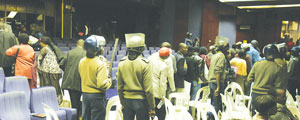
THE MDC-T says the Second All-Stakeholders’ Conference is meant to legitimise the Copac draft constitution.
NewsDay Reporter Moses Matenga (ND) yesterday caught up with the party’s Copac co-chairperson Douglas Mwonzora (DM) in the capital to speak on the conference. Below are excerpts of the interview.
ND: What is the MDC-T’s strategy going into the stakeholders’ conference?
DM: We are simply expecting that there will be a peaceful discussion and we are looking forward to the principals to the Global Political Agreement to set the tone for the conference.
The conference is part of the legitimising process of the draft constitution. For us, it is time for the truth to be revealed that we are not in support of homosexuality. For the first time, delegates are going to discover that the constitution does not provide for homosexuality contrary to the propaganda churned out in the State media.
ND: I understand they are differences with Zanu PF, especially with the view that they have their document they intend to present at the conference. How do you intend to tackle that?
DM: Their document is not one of the official documents of Copac and it’s not one of the materials for the conference. It’s their document, but not the conference document. That document has not been availed to Copac and we have only read about it in the Press.
ND: If other stakeholders decide on views that contradict what is already in the draft, what will be the way forward considering that Article 6 of the GPA is silent on at what stage amendments can be factored in and by whom?
- Chamisa under fire over US$120K donation
- Mavhunga puts DeMbare into Chibuku quarterfinals
- Pension funds bet on Cabora Bassa oilfields
- Councils defy govt fire tender directive
Keep Reading
DM: We can’t control what stakeholders are going to say, but everything they say would be considered on their own merits. Of course, the history of the constitution-making process will be considered when looking at the various demands and recommendations. Our appeal to stakeholders is to understand that Zimbabwe is made up of persons of diverse interests and this has to be respected.
Their comments are going to form part of a report by Copac and its use in making decisions of whether or not to include certain amendments to the draft constitution. Their recommendations will be looked into and check if we did not discuss them during the process. But certain recommendations will be different and we will look at each recommendation on its own merits.
ND: There are certain elements using different strategies to halt the process and these include the latest High Court application intended to stop the conference. What’s your take on that?
DM: This is nothing new and this is the work of the chaos faction of Zanu PF. In fact, it started with the ill-fated constitutional application by one Goodson Nguni which we opposed and which has not been pursued and the application by (Danny) Masukuma is an attempt to get cheap publicity and relevance. This application is doomed to fail.
We find it strange that the well-known Zanu PF activist should try to stop a conference that is being opened by the President of the Republic, who happens to be president of Zanu PF. If it is not indiscipline, then it is utter stupidity.
ND: Assuming that the conference goes on well, what will be the next step?
DM: We expect that within a week of the conference, Copac must be able to produce a report of the conference as well as an analysis of the recommendations and the GPA is clear on who draft the constitution. Drafting includes the framework, filling it with material as well as making amendments or revisions. So amendments will be made by Copac.
ND: So where do the principals come in?
DM: The principals are important and they ensure that the GPA is followed. They are also important in making sure that peace prevails throughout.
They have to make sure contradictions within the process do not make it dysfunctional.
ND: The issue of foreign observers, who are they and where are they coming from?
DM: Individually we are not sure yet, but the invitations have been sent to all embassies to second staff to observe the process if they want and the accreditation is still taking place.
With regard to the numbers, it depends how many are interested. We have not limited international observers.
ND: What is the mechanism to ensure that there is no repeat of the chaos that happened during the First All-Stakeholders’ Conference?
DM: We have enlisted the Zimbabwe Republic Police to maintain law and order because they are mandated to do that. Of course, we have invited the principals who have the ultimate authority and will hopefully instil discipline.







